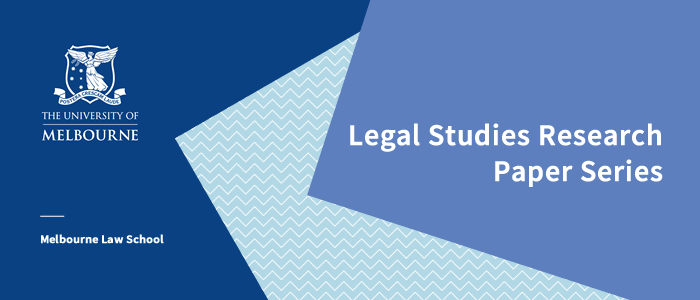Volume 21. No. 5
Wednesday, 28 August 2019

Melbourne Law School published Volume 21 Number 5 of the University of Melbourne Law School Legal Studies Research Paper Series on SSRN.
This issue includes the following articles:
Rachel Davies and Miranda Stewart
The Gatekeeper Court: For the Revenue or for the Taxpayer (828)
Since its establishment, the Federal Court of Australia (“the Court”) has become the leading tax court in the nation. The Federal Court is the final port of call for most taxpayers and for the Federal Commissioner of Taxation. In the spirit of inquiry into the nature of “income” for tax purposes, this paper does both a “wide survey and an exact scrutiny” of aspects of the Court’s record in taxation matters over the last 40 years. The paper presents statistics about tax cases in the Court since its establishment in 1977 and discusses trends. We then turn to discuss important themes in tax cases before the Court, including the boundaries of ordinary income and allowable deductions; the complexity of the tax statute and of the task of statutory interpretation; and the approach of the Court to tax avoidance. Finally, the paper considers some features of tax litigation in the Court and challenges for the future.
Caron Beaton-Wells
Platform Power and Privacy Protection: A Case for Policy Innovation (829)
Antitrust debates regarding competition in data-driven markets, particularly those dominated by digital platforms, have run headlong into issues of privacy. This was inevitable. At the heart of the platform business model is the collection and use, for commercial gain, of unfathomably large amounts of personal in-formation. Such information is the sine qua non of privacy concerns. Given their increasing power as information gate-keepers and intermediaries across swathes of the digital economy, it is barely surprising that platforms find themselves in the line of fire for modern-day privacy concerns.
William Partlett
Post-Soviet Constitution Making (830)
This chapter will examine why many of the countries in the post-Soviet space – which spans eight time zones from Western Ukraine to the Russian Far East and has a population of around 300 million – continue to diverge from divided state constitutionalism. This divergence stems from the persistent influence of a competing constitutional discourse embedded in the region’s contested constitutional tradition. This distinctive discourse argues that a constitution should centralize state power and retain the political supervision of legality to fulfill particular collective goals. This “centralized state discourse” therefore competes with divided state constitutionalism to shape constitutional text and implementation across the post-Soviet space.
Elisa Arcioni and Adrienne Stone
Constitutional Change in Australia: The Paradox of the Frozen Continent (831)
The story of constitutional change under the Australian Constitution has several strands. On the one hand, the Constitution is relatively difficult to change with an unusually rigorous amendment procedure. The Constitution’s rigidity is buttressed by a strong (though not unbroken) tradition of judicial legalism, characterised in the constitutional context by a commitment to textualism and a moderate form of originalism.
Elizabeth Handsley and Arlen Duke
Protecting the Child Consumer from Misleading Advertising: A Comparison of Media Regulation and Consumer Protection Appraches (832)
This article compares two areas of legal regulation with a view to determining the strengths and weaknesses of each as a means of protecting children from misleading advertising. Media regulation, including self-regulatory advertising industry codes, has rules designed to address children’s special vulnerability to advertising, but its application is limited by narrow definitions and concepts that are open to subjective interpretation. Therefore, it places few restrictions, in practice, on the kinds of advertising to which children are exposed. Section 18 of the Australian Consumer Law, by contrast, is broad and comprehensive in its coverage, but does not contain any special provision for children. The article examines the case law on s 18 and determines that there is scope, should an appropriate case arise, for the courts to adopt a test that takes into account children’s cognitive development when determining what is misleading to a young audience. Therefore, consumer law has the potential to serve as a more effective protection for children’s rights and interests as media consumers.
Hari Osofsky, Jacqueline Peel, Brett McDonnell and Anita Foerster
Energy Re-Investment (833)
Despite worsening climate change threats, investment in energy — in the United States and globally — is dominated by fossil fuels. This Article provides a novel analysis of two pathways in corporate and securities law that together have the potential to shift patterns of energy investment. This Article is the first to examine how these two pathways can synergistically promote energy reinvestment. The first pathway moves money away from fossil fuels, while the second helps to spur needed reinvestment. The Article proposes strategies for deploying the tools in the two pathways together, taking into account the motivations and constraints of diverse investors and corporations.